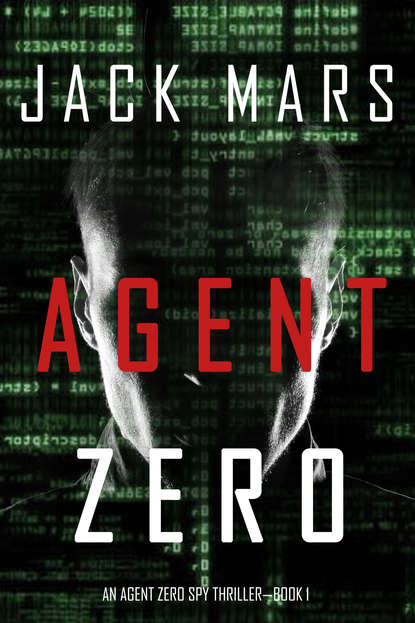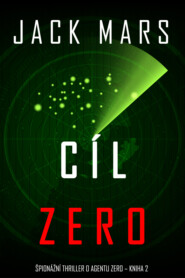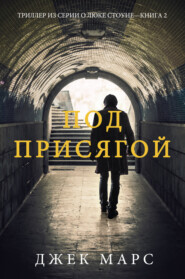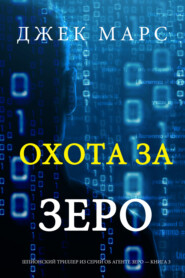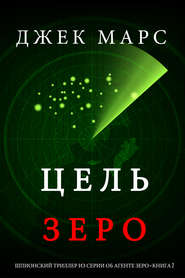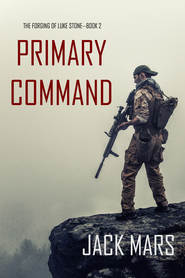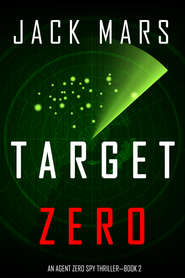По всем вопросам обращайтесь на: info@litportal.ru
(©) 2003-2025.
✖
Agent Zero
Автор
Год написания книги
2019
Настройки чтения
Размер шрифта
Высота строк
Поля
“Great.” Yuri drained his glass and stood, still keeping his left elbow tucked in. “Au revoir.” He waved to the bartender. Then the Serbian led the way toward the rear of Féline, through a small dingy kitchen, and out through a steel door facing a cobblestone alley.
Reid followed him into the night, surprised to see that it had grown so dark so quickly while he was in the bar. At the mouth of the alley was a black SUV, idling gently, with windows tinted nearly as dark as the paint job. The rear door opened before Yuri reached it, and two goons climbed out. Reid didn’t know how else to think of them; each was broad-shouldered, imposing, and doing nothing to try to hide the TEC-9 automatic pistols swinging from harnesses at their armpit.
“Relax, my friends,” said Yuri. “This is Ben. We take him to see Otets.”
Otets. Phonetic Russian for “father.” Or, on the most technical level, “maker.”
“Come,” Yuri said pleasantly. He clapped a hand on Reid’s shoulder. “It is a very nice ride. We will drink champagne on the way. Come.”
Reid’s legs did not want to work. It was risky—too risky. If he got in this car with these men and they discovered who he was, or even that he wasn’t who he said he was, he might very well be a dead man. His girls would be orphans, and they would likely never know what became of him.
But what choice did he have? He couldn’t very well act like he’d changed his mind suddenly; that would be far too suspicious. It was likely he had already taken two steps past the point of no return simply by following Yuri out here. And if he could keep up the charade long enough, he could find the source—and discover what was going on in his own head.
He took a step forward toward the SUV.
“Ah! Un momento, por favor.” Yuri wagged a finger at his brawny escorts. One of them forced Reid’s arms up at his sides, while the other patted him down. First he found the Beretta, tucked into the back of his jeans. Then he dug into Reid’s pockets with two fingers and pulled out the wad of euros and the burner phone, and handed all three to Yuri.
“This you can keep.” The Serbian gave him back the cash. “These, however, we will hang onto. Security. You understand.” Yuri tucked the phone and the gun into the inside pocket of his suede jacket, and for the briefest of moments, Reid saw the brown hilt of a pistol.
“I understand,” Reid said. Now he was unarmed and without any way to call for help if he needed to. I should run, he thought. Just start sprinting and don’t look back…
One of the goons forced his head low and pushed him forward, into the back of the SUV. Both of them climbed in after him and Yuri followed, pulling the door behind him. He sat beside Reid, while the hunched goons, nearly shoulder to shoulder, sat in a custom rear-facing seat opposite them, right behind the driver. A dark-tinted partition separated them from the front seat of the car.
One of the pair knocked on the driver’s partition with two knuckles. “Otets,” he said gruffly.
A heavy, telltale click locked the rear doors, and with it came a stark comprehension of what Reid had done. He had gotten into a car with three armed men with no idea where he was going and very little idea of who he was supposed to be. Fooling Yuri hadn’t been all that difficult, but now he was being taken to some boss… would they know that he wasn’t who he said he was? He fought down the urge to jump forward, yank open the door, and leap out of the car. There was no escape from this, at least not at the moment; he would have to wait until they arrived at their destination and hope that he could get out in one piece.
The SUV rolled forward through the streets of Paris.
CHAPTER SIX
Yuri, who had been so talkative and animated in the French bar, was uncharacteristically silent during the car ride. He opened a compartment alongside his seat and took out a well-worn book with a torn cover—Machiavelli’s The Prince. The professor in Reid wanted to scoff out loud.
The two goons across from him sat silently, eyes directed straight ahead as if they were trying to stare holes through Reid. He quickly memorized their features: the man on the left was bald, white, with a dark handlebar mustache and beady eyes. He had a TEC-9 beneath his shoulder and a Glock 27 tucked in an ankle holster. A jagged pale scar over his left eyebrow suggested a shoddy patch job (not all that dissimilar from what Reid was likely due for once his super-glue intervention healed). He couldn’t tell the man’s nationality.
The second goon was a few shades darker, with a full, unkempt beard and a sizable paunch. His left shoulder appeared to be sagging slightly, as if he was favoring his opposite hip. He too had an automatic pistol tucked under one arm, but no other weapons that Reid could discern.
He could, however, see the mark on his neck. The skin there was puckered and pink, raised slightly from being burned. It was the same brand he had seen on the Arabic brute in the Paris basement. A glyph of some sort, he was certain, but not one that he recognized. The mustached man did not appear to have one, though much of his neck was hidden by his shirt.
Yuri did not have a brand either—at least not one that Reid could see. The collar of the Serbian’s suede jacket rode high. Could be a status symbol, he thought. Something that had to be earned.
The driver directed the vehicle onto A4, leaving Paris behind and heading northeast toward Reims. The tinted windows made the night all the darker; once they left the City of Lights, it was difficult for Reid to make out landmarks. He had to rely on the route markers and signs to know where they were heading. The landscape slowly shifted from the bright urban locale to an idle, bucolic topography, the highway gently sloping with the lay of the land and farms stretching on either side.
After an hour of driving in utter silence, Reid cleared his throat. “Is it much further?” he asked.
Yuri put a finger to his lips and then grinned. “Oui.”
Reid’s nostrils flared, but he said nothing more. He should have asked just how far they would be taking him; for all he knew, they were going clear to Belgium.
Route A4 became A34, which in turn became A304 as they climbed ever further north. The trees that dotted the pastoral countryside grew thicker and closer, wide umbrella-like spruces that swallowed the open farmland and became indistinguishable forests. The gradient of the road increased as the sloping hills turned to small mountains.
He knew this place. Rather, he knew the region, and not because of any flashing vision or implanted memory. He had never been here, but he knew from his studies that they had reached the Ardennes, a mountainous stretch of forest shared between northeastern France, southern Belgium, and northern Luxembourg. It was in the Ardennes that the German army, in 1944, attempted to launch their armored divisions through the densely forested region in an attempt to capture the city of Antwerp. They were thwarted by American and British forces near the river Meuse. The ensuing conflict was dubbed the Battle of the Bulge, and it was the last major offensive of the Germans in World War II.
For some reason, despite how dire his situation was or might soon become, he found some small measure of comfort in thinking about history, his former life, and his students. But then his thoughts again transitioned to his girls being alone and scared and not having any idea where he was or what he had gotten himself into.
Sure enough, Reid soon saw a sign that warned of an approach to the border. Belgique, the sign read, and below that, Belgien, België, Belgium. Less than two miles later, the SUV slowed to a stop at a single small booth with a concrete awning overhead. A man in a thick coat and wool-knit cap peered out at the vehicle. Border security between France and Belgium was a far cry from what most Americans were used to. The driver rolled down the window and spoke to the man, but the words were muted by the closed partition and windows. Reid squinted through the tint and saw the driver’s arm reach out, passing something to the border officer—a bill. A bribe.
The man in the cap waved them through.
Only a few miles down N5, the SUV pulled off of the highway and onto a narrow road that cut parallel to the main thoroughfare. There was no exit sign and the road itself was barely paved; it was an access road, likely one that was created for logging vehicles. The car jostled over the deep ruts in the dirt. The two goons bumped against one another opposite Reid, but still they continued to stare straight forward at him.
He checked the cheap watch he had bought at the pharmacy. Two hours and forty-six minutes they had been traveling. Last night he had been in the US, and then woken up in Paris, and now he was in Belgium. Relax, his subconscious coaxed. Nowhere you haven’t been before. Just pay attention and keep your mouth shut.
Both sides of the road appeared to be nothing but thick trees. The SUV continued on, climbing up the side of a curving mountain and down again. All the while Reid peered out the window, pretending to be idle but looking for any sort of landmark or sign that would tell him where they were—ideally something he could recount later to the authorities, if need be.
There were lights ahead, though at his angle he could not see the source. The SUV slowed again and rolled to a gentle stop. Reid saw a black wrought-iron fence, each post topped in a dangerous spike, stretching to either side and vanishing into the darkness. Alongside their vehicle was a small guard house made of glass and dark brick, a fluorescent light illuminating the inside. A man emerged. He wore slacks and a pea coat, the collar flipped up around his neck and a gray scarf knotted at his throat. He made no attempt to hide the silenced MP7 hanging from a strap over his right shoulder. In fact, as he stepped toward the car, he gripped the automatic pistol, though he did not raise it.
Heckler & Koch, production variant MP7A1, said the voice in Reid’s head. Seven-point-one-inch suppressor. Elcan reflex sight. Thirty-round magazine.
The driver rolled down his window and spoke with the man for just a few seconds. Then the guard rounded the SUV and pulled open the door on Yuri’s side. He bent and peered into the cab. Reid caught the scent of rye whiskey and felt the sting of the frigid rush of air that came with it. The man glanced at each of them in turn, his gaze lingering on Reid.
“Kommunikator,” said Yuri. “Chtoby uvidet’ nachal’nika.” Russian. Messenger, to see the boss.
The guard said nothing. He closed the door again and returned to his post, pressing a button on a small console. The black-iron gate hummed as it rolled aside, and the SUV pulled through.
Reid’s throat tightened as the full gravity of his situation pressed in on him. He had gone to the meeting with the intention of getting information about whatever was happening—not just to him, but with all the talk of plans and sheikhs and foreign cities. He had gotten into the car with Yuri and the two goons in the heat of finding a source. He had let them take him out of the country and into the middle of a dense forested region, and now they were behind a tall, guarded, spiked gate. He had no idea how he might get out of this if something went awry.
Relax. You’ve done this before.
No I haven’t! he thought desperately. I’m a college professor from New York. I don’t know what I’m doing. Why did I do this? My girls…
Just give in to it. You’ll know what to do.
Reid took a deep breath, but it did little to calm his nerves. He peered out the window. In the darkness, he could just barely make out their surroundings. There were no trees behind the gate, but rather rows upon rows of stout vines, climbing and weaving through waist-high latticework… It was a vineyard. Whether it was actually a vineyard or merely a front, he wasn’t sure, but it was at least something recognizable, something that could be seen by helicopter or a drone flyover.
Good. That’ll come in handy later.
If there is a later.
The SUV drove slowly over the gravel road for another mile or so before the vineyard ended. Before them was a palatial estate, practically a castle, built in gray stone with arching windows and ivy climbing up the southern façade. For the briefest of moments, Reid appreciated the beautiful architecture; it was likely two hundred years old, maybe more. But they did not stop there; instead, the car circled around the grand home and behind it. After another half mile, they pulled into a small lot and the driver cut the engine.
They had arrived. But where they had arrived to, he had no idea.
The goons exited first, and then Reid climbed out, followed by Yuri. The bitter cold took his breath away. He clenched his jaw to keep his teeth from chattering. Their two large escorts seemed to not be bothered by it at all.
About forty yards from them was a large, squat structure, two stories tall and several times as wide; windowless and made of corrugated steel painted beige. Some sort of facility, Reid reasoned—perhaps for winemaking. But he doubted it.
Yuri groaned as he stretched his limbs. Then he grinned at Reid. “Ben, I understand we are now very good friends, but still…” He pulled from his jacket pocket a narrow length of black fabric. “I must insist.”
Reid followed him into the night, surprised to see that it had grown so dark so quickly while he was in the bar. At the mouth of the alley was a black SUV, idling gently, with windows tinted nearly as dark as the paint job. The rear door opened before Yuri reached it, and two goons climbed out. Reid didn’t know how else to think of them; each was broad-shouldered, imposing, and doing nothing to try to hide the TEC-9 automatic pistols swinging from harnesses at their armpit.
“Relax, my friends,” said Yuri. “This is Ben. We take him to see Otets.”
Otets. Phonetic Russian for “father.” Or, on the most technical level, “maker.”
“Come,” Yuri said pleasantly. He clapped a hand on Reid’s shoulder. “It is a very nice ride. We will drink champagne on the way. Come.”
Reid’s legs did not want to work. It was risky—too risky. If he got in this car with these men and they discovered who he was, or even that he wasn’t who he said he was, he might very well be a dead man. His girls would be orphans, and they would likely never know what became of him.
But what choice did he have? He couldn’t very well act like he’d changed his mind suddenly; that would be far too suspicious. It was likely he had already taken two steps past the point of no return simply by following Yuri out here. And if he could keep up the charade long enough, he could find the source—and discover what was going on in his own head.
He took a step forward toward the SUV.
“Ah! Un momento, por favor.” Yuri wagged a finger at his brawny escorts. One of them forced Reid’s arms up at his sides, while the other patted him down. First he found the Beretta, tucked into the back of his jeans. Then he dug into Reid’s pockets with two fingers and pulled out the wad of euros and the burner phone, and handed all three to Yuri.
“This you can keep.” The Serbian gave him back the cash. “These, however, we will hang onto. Security. You understand.” Yuri tucked the phone and the gun into the inside pocket of his suede jacket, and for the briefest of moments, Reid saw the brown hilt of a pistol.
“I understand,” Reid said. Now he was unarmed and without any way to call for help if he needed to. I should run, he thought. Just start sprinting and don’t look back…
One of the goons forced his head low and pushed him forward, into the back of the SUV. Both of them climbed in after him and Yuri followed, pulling the door behind him. He sat beside Reid, while the hunched goons, nearly shoulder to shoulder, sat in a custom rear-facing seat opposite them, right behind the driver. A dark-tinted partition separated them from the front seat of the car.
One of the pair knocked on the driver’s partition with two knuckles. “Otets,” he said gruffly.
A heavy, telltale click locked the rear doors, and with it came a stark comprehension of what Reid had done. He had gotten into a car with three armed men with no idea where he was going and very little idea of who he was supposed to be. Fooling Yuri hadn’t been all that difficult, but now he was being taken to some boss… would they know that he wasn’t who he said he was? He fought down the urge to jump forward, yank open the door, and leap out of the car. There was no escape from this, at least not at the moment; he would have to wait until they arrived at their destination and hope that he could get out in one piece.
The SUV rolled forward through the streets of Paris.
CHAPTER SIX
Yuri, who had been so talkative and animated in the French bar, was uncharacteristically silent during the car ride. He opened a compartment alongside his seat and took out a well-worn book with a torn cover—Machiavelli’s The Prince. The professor in Reid wanted to scoff out loud.
The two goons across from him sat silently, eyes directed straight ahead as if they were trying to stare holes through Reid. He quickly memorized their features: the man on the left was bald, white, with a dark handlebar mustache and beady eyes. He had a TEC-9 beneath his shoulder and a Glock 27 tucked in an ankle holster. A jagged pale scar over his left eyebrow suggested a shoddy patch job (not all that dissimilar from what Reid was likely due for once his super-glue intervention healed). He couldn’t tell the man’s nationality.
The second goon was a few shades darker, with a full, unkempt beard and a sizable paunch. His left shoulder appeared to be sagging slightly, as if he was favoring his opposite hip. He too had an automatic pistol tucked under one arm, but no other weapons that Reid could discern.
He could, however, see the mark on his neck. The skin there was puckered and pink, raised slightly from being burned. It was the same brand he had seen on the Arabic brute in the Paris basement. A glyph of some sort, he was certain, but not one that he recognized. The mustached man did not appear to have one, though much of his neck was hidden by his shirt.
Yuri did not have a brand either—at least not one that Reid could see. The collar of the Serbian’s suede jacket rode high. Could be a status symbol, he thought. Something that had to be earned.
The driver directed the vehicle onto A4, leaving Paris behind and heading northeast toward Reims. The tinted windows made the night all the darker; once they left the City of Lights, it was difficult for Reid to make out landmarks. He had to rely on the route markers and signs to know where they were heading. The landscape slowly shifted from the bright urban locale to an idle, bucolic topography, the highway gently sloping with the lay of the land and farms stretching on either side.
After an hour of driving in utter silence, Reid cleared his throat. “Is it much further?” he asked.
Yuri put a finger to his lips and then grinned. “Oui.”
Reid’s nostrils flared, but he said nothing more. He should have asked just how far they would be taking him; for all he knew, they were going clear to Belgium.
Route A4 became A34, which in turn became A304 as they climbed ever further north. The trees that dotted the pastoral countryside grew thicker and closer, wide umbrella-like spruces that swallowed the open farmland and became indistinguishable forests. The gradient of the road increased as the sloping hills turned to small mountains.
He knew this place. Rather, he knew the region, and not because of any flashing vision or implanted memory. He had never been here, but he knew from his studies that they had reached the Ardennes, a mountainous stretch of forest shared between northeastern France, southern Belgium, and northern Luxembourg. It was in the Ardennes that the German army, in 1944, attempted to launch their armored divisions through the densely forested region in an attempt to capture the city of Antwerp. They were thwarted by American and British forces near the river Meuse. The ensuing conflict was dubbed the Battle of the Bulge, and it was the last major offensive of the Germans in World War II.
For some reason, despite how dire his situation was or might soon become, he found some small measure of comfort in thinking about history, his former life, and his students. But then his thoughts again transitioned to his girls being alone and scared and not having any idea where he was or what he had gotten himself into.
Sure enough, Reid soon saw a sign that warned of an approach to the border. Belgique, the sign read, and below that, Belgien, België, Belgium. Less than two miles later, the SUV slowed to a stop at a single small booth with a concrete awning overhead. A man in a thick coat and wool-knit cap peered out at the vehicle. Border security between France and Belgium was a far cry from what most Americans were used to. The driver rolled down the window and spoke to the man, but the words were muted by the closed partition and windows. Reid squinted through the tint and saw the driver’s arm reach out, passing something to the border officer—a bill. A bribe.
The man in the cap waved them through.
Only a few miles down N5, the SUV pulled off of the highway and onto a narrow road that cut parallel to the main thoroughfare. There was no exit sign and the road itself was barely paved; it was an access road, likely one that was created for logging vehicles. The car jostled over the deep ruts in the dirt. The two goons bumped against one another opposite Reid, but still they continued to stare straight forward at him.
He checked the cheap watch he had bought at the pharmacy. Two hours and forty-six minutes they had been traveling. Last night he had been in the US, and then woken up in Paris, and now he was in Belgium. Relax, his subconscious coaxed. Nowhere you haven’t been before. Just pay attention and keep your mouth shut.
Both sides of the road appeared to be nothing but thick trees. The SUV continued on, climbing up the side of a curving mountain and down again. All the while Reid peered out the window, pretending to be idle but looking for any sort of landmark or sign that would tell him where they were—ideally something he could recount later to the authorities, if need be.
There were lights ahead, though at his angle he could not see the source. The SUV slowed again and rolled to a gentle stop. Reid saw a black wrought-iron fence, each post topped in a dangerous spike, stretching to either side and vanishing into the darkness. Alongside their vehicle was a small guard house made of glass and dark brick, a fluorescent light illuminating the inside. A man emerged. He wore slacks and a pea coat, the collar flipped up around his neck and a gray scarf knotted at his throat. He made no attempt to hide the silenced MP7 hanging from a strap over his right shoulder. In fact, as he stepped toward the car, he gripped the automatic pistol, though he did not raise it.
Heckler & Koch, production variant MP7A1, said the voice in Reid’s head. Seven-point-one-inch suppressor. Elcan reflex sight. Thirty-round magazine.
The driver rolled down his window and spoke with the man for just a few seconds. Then the guard rounded the SUV and pulled open the door on Yuri’s side. He bent and peered into the cab. Reid caught the scent of rye whiskey and felt the sting of the frigid rush of air that came with it. The man glanced at each of them in turn, his gaze lingering on Reid.
“Kommunikator,” said Yuri. “Chtoby uvidet’ nachal’nika.” Russian. Messenger, to see the boss.
The guard said nothing. He closed the door again and returned to his post, pressing a button on a small console. The black-iron gate hummed as it rolled aside, and the SUV pulled through.
Reid’s throat tightened as the full gravity of his situation pressed in on him. He had gone to the meeting with the intention of getting information about whatever was happening—not just to him, but with all the talk of plans and sheikhs and foreign cities. He had gotten into the car with Yuri and the two goons in the heat of finding a source. He had let them take him out of the country and into the middle of a dense forested region, and now they were behind a tall, guarded, spiked gate. He had no idea how he might get out of this if something went awry.
Relax. You’ve done this before.
No I haven’t! he thought desperately. I’m a college professor from New York. I don’t know what I’m doing. Why did I do this? My girls…
Just give in to it. You’ll know what to do.
Reid took a deep breath, but it did little to calm his nerves. He peered out the window. In the darkness, he could just barely make out their surroundings. There were no trees behind the gate, but rather rows upon rows of stout vines, climbing and weaving through waist-high latticework… It was a vineyard. Whether it was actually a vineyard or merely a front, he wasn’t sure, but it was at least something recognizable, something that could be seen by helicopter or a drone flyover.
Good. That’ll come in handy later.
If there is a later.
The SUV drove slowly over the gravel road for another mile or so before the vineyard ended. Before them was a palatial estate, practically a castle, built in gray stone with arching windows and ivy climbing up the southern façade. For the briefest of moments, Reid appreciated the beautiful architecture; it was likely two hundred years old, maybe more. But they did not stop there; instead, the car circled around the grand home and behind it. After another half mile, they pulled into a small lot and the driver cut the engine.
They had arrived. But where they had arrived to, he had no idea.
The goons exited first, and then Reid climbed out, followed by Yuri. The bitter cold took his breath away. He clenched his jaw to keep his teeth from chattering. Their two large escorts seemed to not be bothered by it at all.
About forty yards from them was a large, squat structure, two stories tall and several times as wide; windowless and made of corrugated steel painted beige. Some sort of facility, Reid reasoned—perhaps for winemaking. But he doubted it.
Yuri groaned as he stretched his limbs. Then he grinned at Reid. “Ben, I understand we are now very good friends, but still…” He pulled from his jacket pocket a narrow length of black fabric. “I must insist.”





